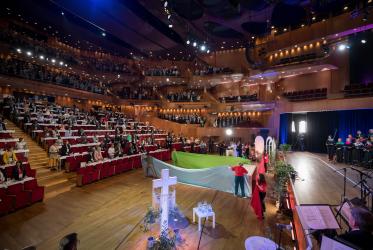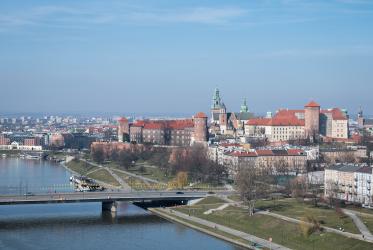31 May 2006
Given at the dinner in his honour by the Lutheran World Federation
Dear Reverend Doctor Noko and fellow guests,
I deem it a great pleasure to be able to sit at this table and to break bread with you at this lunch that you have so graciously prepared in order to honour my Lowliness and the delegation of the Church of Greece on its first official visit ever to the Lutheran World Federation, and I take this opportunity to thank You personally, Doctor Noko, and the members of your staff for the warm hospitality extended us.
At this time, it is only natural that my thoughts go back to the Sixteenth Century when Philip Melanchthon undertook the historical initiative to cultivate relations with the Orthodox Church during the Patriarchate of Joasaph II (1555-1565) and of course to the celebrated correspondence between the Wittenburg Divines and Ecumenical Patriarch Jeremias II (1576-1581) facilitated by the presence of the Deacon Demetrios Mysos at Wittenburg University. Those were both important and at the same time troubled times. Important, in that they signified a turning point in the history of Christianity in the West, signaling a desire to cast off innovations and return to the purity of the Apostolic Faith; troubled, because of the violent reactions that ensued, the multiplicity of, and the manner in which, these reforms were put forth and reacted against. They were troubled times for the East as well, and specifically for the Orthodox Church, because of its isolation from the rest of Christianity, due to the Ottoman conquest and occupation of the Balkans and the Near East, and the Tartar Invasion of Orthodox Russia; further, the insufficiency of the means of communication that were available at the time also played a significant role in curbing the creation of closer relations and collaboration.
Indeed, it is thanks to the initiative of the Lutheran World Federation, taken nearly forty years ago in 1967, when it sent an official delegation to the Ecumenical Patriarchate in order to express its desire to initiate an official Theological Dialogue between our two Churches, that the relations between them, long frozen, began to thaw. One year later, our Churches began a systematic preparation for the initiation of the Dialogue that officially opened in Espoo, Finland on the 27th of August in 1981.
Since then, the Joint Commission on Orthodox-Lutheran Dialogue has met nine times in Plenary sessions, the last being held in October of last year, and has dealt with a vast number of issues such as the Doctrine of the Holy Trinity, Ecclesiology, Soteriology, Divine Revelation, Tradition and Scripture, Divine inspiration and the Canonical Books of Scripture, Soteriology in the Light of the Ecumenical Councils, salvation, grace, justification and synergy, points of convergence and divergence, and the Mystery of the Holy Eucharist. Indeed, these doctrinal discussions have brought our Churches closer together and have increased our understanding and appreciation of one another.
Furthermore, our collaboration within the framework of the World Council of Churches as ecumenical partners has helped to cultivate warm and friendly relations, and we are indeed grateful to the Council for bringing us closer together.
All this is indeed significant. It can, however, be increased even more. Bi-lateral contacts and cooperation on burning social issues of mutual concern and common interest must, and can be, cultivated. Issues such as globalisation, bioethics, human rights, poverty, human trafficking, environmental and climatic change are but a few of the many issues upon which we can work together and provide a unified witness in a world society in which Christian moral principles are often called into question and even openly opposed.
More importantly, the Churches are facing a continuously increasing secularisation of society, especially here, on the European Continent, where the Lutheran Church was first established and where the Church of Greece was established in the first century by the Apostle St. Paul. Europe is losing its Christian identity, its Christian soul. The moral and ethical principles of Christianity which have shaped European values and culture over the centuries are now being severed and detached from their Christian roots and converted into ideological and self-sufficient principles divorced from the very Christian views concerning God, man and Creation that gave them birth. How tragic indeed to see these values employed in trying to eradicate the Christian heritage and identity within the European context!
Facing such matters unilaterally is a luxury, I believe, that none of us can any longer afford, and necessitates the fostering of closer relations and collaboration between our Churches and I should like to propose the establishment of a joint commission to deal with such issues.
It is to this increased collaboration then, that we look forward, and pray that God will help us to realise and promote. And it is in this spirit that I raise my glass and drink to the further increase of fraternal relations and fruitful collaboration between our Churches.




